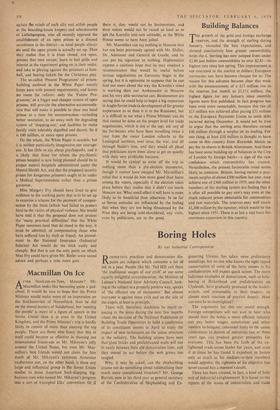Building Balances
THE growth of the gold and foreign exchange reserves, and the strength of sterling during January, exceeded the best expectations, and showed conclusively how greater convertibility helps the £. Sterling has now jumped from under $2.80 just before convertibility to over $2.81—its highest rate since last spring. This improvement js. not restricted to the market in dollars; European currencies, too, have become cheaper for us. The reason for this advance became clear this week with the announcement of a £15 million rise in the reserves last month to £1,111 million, the highest figure for any January since monthly figures were first published. In fact progress has been even more remarkable, because this rise of £15 million was achieved after paying £31 million to the European Payments Union to settle debt incurred during December. It would not be true to argue that the sterling area therefore earned £46 million through a surplus on its trading. For one thing, at least £10 million is thought to have come to this country from Reynolds Metals to pay for its shares in British Aluminium. And there has been some building-up of balances in the City of London by foreign banks—a sign of the new confidence which convertibility has created. Nevertheless, the present favourable trend seems likely to continue. Britain, having earned a pay-. ments surplus of about £500 million last year, may achieve one of £300 million in 1959, and the other members of the sterling system are finding that it is after all possible to pay one's way even at the much reduced prices obtainable for commodities and raw materials. The reserves may well touch £1,300 million by the summer, which would he the highest since 1951. There is.at last a real basis for enormous expansion in this country.






































 Previous page
Previous page